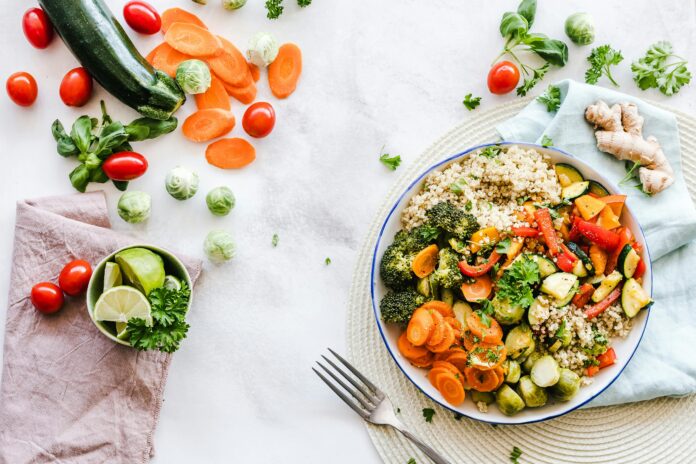10 Foods to Eat to Control Blood Sugar Levels
Maintaining healthy blood sugar levels is crucial for overall health, particularly for individuals with diabetes or those at risk of developing it. The foods we eat can play a significant role in regulating blood sugar, as they influence how the body absorbs and processes glucose. In this article, we will explore the foods you should incorporate into your diet to help manage your blood sugar levels effectively.
1. Non-Starchy Vegetables
Non-starchy vegetables are some of the best foods for blood sugar control. They are low in carbohydrates and high in fiber, which helps slow the absorption of sugar into the bloodstream. High-fiber foods also promote satiety, preventing overeating and helping to regulate blood sugar levels over time.
Some great examples of non-starchy vegetables include:
- Spinach
- Kale
- Broccoli
- Cauliflower
- Zucchini
- Bell peppers
These vegetables are rich in vitamins, minerals, and antioxidants, offering a host of additional health benefits. You can include them in salads, stir-fries, or even enjoy them steamed as a side dish.
2. Whole Grains
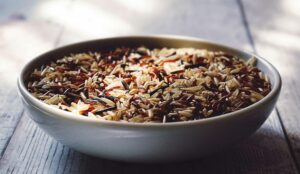
Whole grains are a healthier choice compared to refined grains, as they are rich in fiber, which helps stabilize blood sugar. Unlike white bread or white rice, whole grains are digested more slowly, preventing sharp spikes in blood sugar.
Some excellent whole grain options include:
- Quinoa
- Brown rice
- Barley
- Oats
- Whole wheat
Whole grains are also packed with essential nutrients such as magnesium, B vitamins, and iron, which further contribute to blood sugar control. Oats, for instance, have a specific fiber called beta-glucan that can help improve insulin sensitivity.
3. Legumes
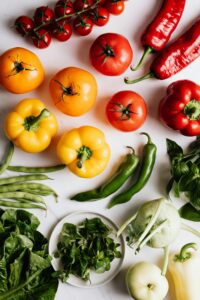
Legumes, including beans, lentils, and peas, are high in fiber and protein while being low in fat. This makes them an excellent food choice for controlling blood sugar levels. The fiber content in legumes slows digestion and prevents rapid increases in blood glucose.
Common legumes to include in your diet are:
- Black beans
- Chickpeas
- Lentils
- Kidney beans
- Peas
Adding legumes to soups, stews, salads, or as a side dish can help balance blood sugar levels while also providing long-lasting energy.
4. Nuts and Seeds
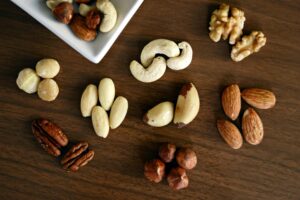
Nuts and seeds are great sources of healthy fats, fiber, and protein, making them ideal for stabilizing blood sugar. The healthy fats in these foods can slow the absorption of carbohydrates, preventing blood sugar spikes. Additionally, nuts and seeds are rich in magnesium, a mineral that has been linked to improved insulin sensitivity.
Some nutritious nuts and seeds for blood sugar control include:
- Almonds
- Walnuts
- Chia seeds
- Flaxseeds
- Sunflower seeds
Eating a small handful of nuts or adding seeds to smoothies, oatmeal, or salads can help manage your blood sugar levels.
5. Berries

Berries, such as blueberries, strawberries, raspberries, and blackberries, are rich in fiber and antioxidants, making them a great choice for blood sugar control. These fruits have a low glycemic index, which means they have a minimal impact on blood sugar levels when consumed in moderation. The fiber in berries also helps slow down the release of sugar into the bloodstream.
Berries can be eaten as a snack, added to yogurt, or blended into smoothies. You can also enjoy them fresh or frozen.
6. Healthy Fats
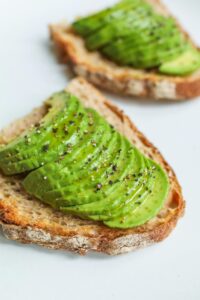
Incorporating healthy fats into your diet can also support blood sugar control. Healthy fats can help slow the absorption of glucose, which prevents rapid fluctuations in blood sugar levels. Moreover, they promote satiety, reducing the likelihood of overeating.
Sources of healthy fats include:
- Avocados
- Olive oil
- Coconut oil
- Fatty fish (salmon, mackerel, sardines)
Avocados, for example, are loaded with monounsaturated fats and fiber, both of which contribute to stable blood sugar levels. Fatty fish, on the other hand, are rich in omega-3 fatty acids, which have been shown to reduce inflammation and improve insulin sensitivity.
7. Cinnamon

Cinnamon is a spice that has been linked to improved blood sugar control. It contains compounds that can increase insulin sensitivity, allowing your body to process glucose more effectively. Including cinnamon in your diet may help lower fasting blood sugar levels and improve the overall effectiveness of insulin.
You can sprinkle cinnamon on oatmeal, add it to smoothies, or use it as a seasoning in savory dishes like curries or roasted vegetables.
8. Apple Cider Vinegar
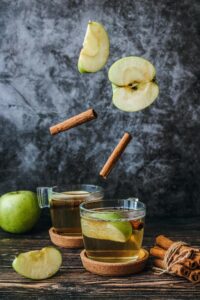
Apple cider vinegar (ACV) has gained popularity as a natural remedy for blood sugar control. Some studies suggest that consuming ACV before meals can help improve insulin sensitivity and lower blood sugar levels after eating. This effect is believed to be due to the acetic acid in vinegar, which may slow the digestion of carbohydrates.
To incorporate ACV into your diet, dilute one to two tablespoons of apple cider vinegar in a glass of water and drink it before meals. Be cautious, as undiluted vinegar can be harsh on your teeth and digestive system.
9. Garlic

Garlic has been found to have various health benefits, including the ability to lower blood sugar levels. The active compounds in garlic, particularly allicin, may help improve insulin sensitivity and reduce blood glucose levels. Some studies suggest that garlic supplementation may be beneficial for individuals with type 2 diabetes.
You can add garlic to savory dishes like soups, stews, stir-fries, or use it to season vegetables and meats.
10. Green Tea

Green tea contains polyphenols, which are powerful antioxidants that have been shown to improve insulin sensitivity and regulate blood sugar levels. Drinking green tea regularly may help prevent the onset of type 2 diabetes and support overall blood sugar control.
Aim to drink one to two cups of green tea per day. You can enjoy it plain or add a splash of lemon for extra flavor.
Conclusion
Managing blood sugar levels is an essential part of maintaining good health, particularly for those with diabetes or insulin resistance. Incorporating nutrient-dense foods like non-starchy vegetables, whole grains, legumes, nuts, and seeds into your diet can help stabilize blood sugar and promote overall well-being. Additionally, foods like berries, cinnamon, and garlic offer specific benefits for blood sugar regulation.
By making mindful choices about what you eat and focusing on whole, minimally processed foods, you can better manage your blood sugar levels and reduce the risk of complications associated with poor blood sugar control. Always remember to consult with a healthcare provider or dietitian before making significant changes to your diet, especially if you have diabetes or other underlying health conditions.
Key Takeaways :
Non-Starchy Vegetables:
Low in carbs and high in fiber, they help regulate blood sugar levels by slowing sugar absorption.
Examples: Spinach, broccoli, bell peppers, and kale.
Whole Grains:
Whole grains like quinoa, oats, and brown rice are rich in fiber, which helps stabilize blood sugar and improve insulin sensitivity.
They prevent rapid spikes in blood glucose compared to refined grains.
Legumes:
Beans, lentils, and peas are high in fiber and protein, which slow digestion and help prevent blood sugar spikes.
Include legumes in soups, stews, or salads.
Nuts and Seeds:
Rich in healthy fats, fiber, and protein, nuts and seeds stabilize blood sugar and provide essential nutrients like magnesium.
Good options include almonds, walnuts, chia seeds, and flaxseeds.
Berries:
Low glycemic index and high in fiber, berries help regulate blood sugar levels.
Examples: Blueberries, strawberries, raspberries.
Healthy Fats:
Sources like avocados, olive oil, and fatty fish slow glucose absorption, help improve insulin sensitivity, and promote satiety.
Omega-3-rich foods like salmon are particularly beneficial.
Cinnamon:
May improve insulin sensitivity and help lower fasting blood sugar levels.
Add to oatmeal, smoothies, or use as a seasoning in cooking.
Apple Cider Vinegar:
Helps improve insulin sensitivity and lowers post-meal blood sugar levels.
Dilute in water and drink before meals for potential benefits.
Garlic:
Contains compounds like allicin, which may lower blood sugar levels and improve insulin sensitivity.
Incorporate garlic into savory dishes for both flavor and health benefits.
Green Tea:
Rich in antioxidants, green tea can enhance insulin sensitivity and help regulate blood sugar.
Drinking 1-2 cups a day may contribute to long-term blood sugar control.
By focusing on whole, nutrient-dense foods and maintaining a balanced diet rich in fiber, healthy fats, and protein, you can better manage your blood sugar levels and support overall health.
FAQ
1. What are the best foods to eat for controlling blood sugar?
The best foods for controlling blood sugar include:
- Non-starchy vegetables (e.g., spinach, broccoli, cauliflower)
- Whole grains (e.g., quinoa, oats, brown rice)
- Legumes (e.g., beans, lentils, chickpeas)
- Nuts and seeds (e.g., almonds, walnuts, chia seeds)
- Berries (e.g., blueberries, strawberries)
- Healthy fats (e.g., avocados, olive oil, fatty fish)
- Cinnamon and apple cider vinegar can also help with blood sugar regulation.
2. How does fiber help in controlling blood sugar?
Fiber helps control blood sugar by slowing the absorption of glucose into the bloodstream, which prevents rapid spikes in blood sugar after meals. Foods high in soluble fiber (like oats, legumes, and non-starchy vegetables) are especially beneficial for stabilizing blood sugar levels.
3. Can I eat fruit if I have high blood sugar?
Yes, fruits like berries (e.g., strawberries, blueberries, raspberries) are great choices for people with high blood sugar. They have a low glycemic index, meaning they cause minimal increases in blood sugar. It’s best to consume them in moderation, focusing on whole fruits rather than juices.
4. What is the role of whole grains in blood sugar management?
Whole grains are high in fiber and have a lower glycemic index compared to refined grains like white bread and pasta. They release sugar more slowly into the bloodstream, helping prevent blood sugar spikes and contributing to better long-term blood sugar control.
5. How can nuts and seeds help regulate blood sugar?
Nuts and seeds are rich in healthy fats, protein, and fiber, all of which work together to stabilize blood sugar. They can prevent large fluctuations in blood glucose levels, increase satiety, and improve insulin sensitivity. Popular choices include almonds, walnuts, flaxseeds, and chia seeds.
6. Can cinnamon lower blood sugar?
Yes, cinnamon has been shown to improve insulin sensitivity and lower fasting blood sugar levels. Adding cinnamon to your diet, such as in oatmeal or smoothies, may help manage blood sugar, but it should be used in moderation as part of a balanced diet.
7. Is apple cider vinegar effective for blood sugar control?
Some studies suggest that apple cider vinegar may improve insulin sensitivity and lower blood sugar levels after meals. To use it, dilute 1-2 tablespoons of apple cider vinegar in a glass of water and drink it before meals. Always consult with a healthcare professional before making changes to your diet.
8. What healthy fats should I include in my diet for blood sugar control?
Healthy fats, such as those found in avocados, olive oil, fatty fish (like salmon and mackerel), and nuts, can help regulate blood sugar. These fats slow carbohydrate digestion, helping prevent blood sugar spikes. Omega-3 fatty acids from fatty fish are particularly beneficial for insulin sensitivity.
9. Are legumes good for managing blood sugar?
Yes, legumes like beans, lentils, and peas are excellent choices for blood sugar control. They are high in fiber and protein, which help stabilize blood glucose levels and prevent spikes after meals. Incorporate them into soups, salads, or stews for added nutrition.
10. Can green tea help control blood sugar?
Green tea is rich in antioxidants and polyphenols that may improve insulin sensitivity and regulate blood sugar. Drinking 1-2 cups of green tea daily may help support blood sugar management over time. However, it should be part of a balanced diet, not a standalone solution.
11. How often should I eat to control blood sugar?
Eating regular, balanced meals and snacks throughout the day can help maintain stable blood sugar levels. Aim for 3 main meals and 1-2 snacks, making sure to include fiber-rich foods, lean proteins, and healthy fats to prevent blood sugar dips or spikes.
12. What foods should I avoid to control blood sugar?
To better manage blood sugar, avoid:
- Refined carbs like white bread, pasta, and sugary baked goods.
- Sugary drinks (e.g., soda, sweetened coffee).
- Processed foods that are high in unhealthy fats and sugars.
- Fried foods that can contribute to inflammation and insulin resistance.
13. Does drinking water help control blood sugar?
Yes, staying hydrated is essential for blood sugar control. Dehydration can cause blood sugar levels to rise, so it’s important to drink plenty of water throughout the day. Aim for at least 8 cups of water daily, more if you’re active.
14. What role does magnesium play in blood sugar control?
Magnesium is a crucial mineral that supports insulin function and helps regulate blood sugar. Foods rich in magnesium, such as leafy greens, nuts, seeds, and whole grains, can help improve insulin sensitivity and lower blood sugar levels.
15. Can I have a healthy dessert while managing blood sugar?
Yes, you can enjoy healthy desserts that are low in sugar and high in fiber and healthy fats. Examples include chia pudding, Greek yogurt with berries, or almond flour-based cookies. Look for alternatives that use natural sweeteners like stevia or monk fruit instead of refined sugar.
Maintaining healthy blood sugar levels is about balance. By choosing foods that are high in fiber, healthy fats, and lean proteins, and minimizing refined sugars and carbohydrates, you can take control of your blood sugar and improve overall health. Always consult with a healthcare provider to tailor these dietary changes to your individual needs.
Check out this post :https://buzzrival.com/5-things-about-merzouga-moroccan-desert/
Check out our insta : https://www.instagram.com/bsm_kitchens_design/
Control Blood sugar,Control Blood sugar,Control Blood sugar,Control Blood sugar,Control Blood sugar,Control Blood sugar,Control Blood sugar,Control Blood sugar,Control Blood sugar,Control Blood sugar,Control Blood sugar,Control Blood sugar,Control Blood sugar,Control Blood sugar,



